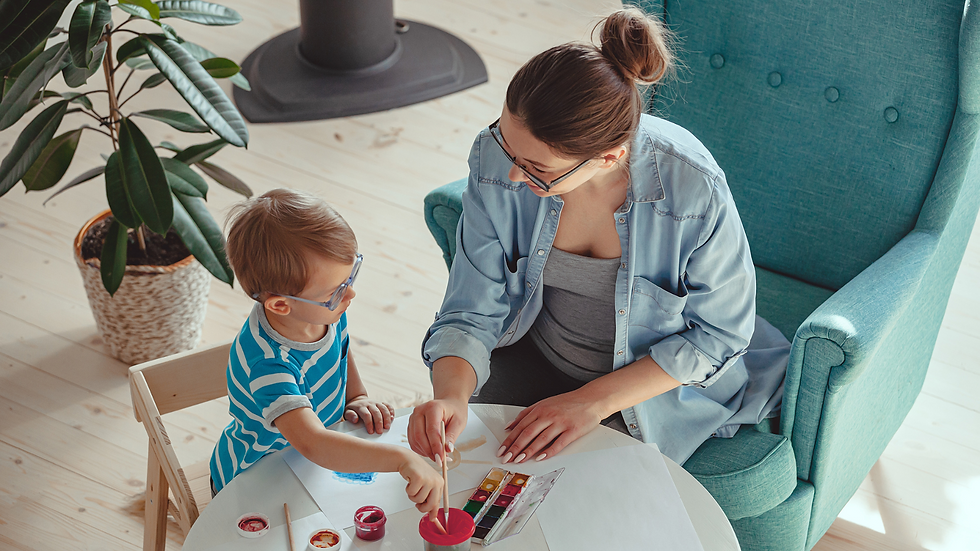The Art of Co-Regulation: The Pathway Towards Establishing Relational Emotional Stability
- Feb 6, 2023
- 3 min read
by Lauren Fallat, LPC LPAT ATR-BC
Emotions play an important role in our lives. They can help us make decisions, set goals and achieve them, and connect with other people. But sometimes emotions can get in the way, leading to problems in our personal lives, family functioning, school, work, and relationships.
On any given day, we might experience a range of emotions – happiness, sadness, anger, frustration, anxiety, and joy are just a few examples. While these emotions are normal and natural, sometimes they can be overwhelming or seem out of control.
From the time we’re born, we learn to regulate our emotions in order to interact effectively with our caregivers and the people around us. This process of co-regulation continues throughout our lives, as we constantly adjust our emotions to match those of the people around us.
While co-regulation is essential for healthy social interactions, it can also be a source of stress. In particularly stressful situations, it can be difficult to maintain our composure and regulate our emotions independently.
In the context of childhood development, most parents would agree that emotions are a big part of family life. From happiness and love, to sadness and anger, emotions are constantly running high. And while it's often easy to identify and understand our own emotions, it's not always so easy to understand and deal with the emotions of children who lack the neural development to fully self-regulate, rationalize and control impulses.
This is where emotional co-regulation comes in. Self-regulation is the ability to control one's emotions, thoughts, and behaviors. Emotional coregulation is the process of sharing, coordinating, and balancing emotions between two or more individuals.
Emotional co-regulation is the process of understanding and managing the emotions of oneself and others. It's about being able to identify and understand your own emotions, as well as the emotions of others, in order to respond in a healthy way. This can be done by sharing and regulating emotions, as well as by coordinating behavior to stabilize the emotional climate.
Emotional co-regulation is essential for healthy development, both mentally and emotionally. Improving emotional co-regulation can improve mental health, communication skills, and relationships. It is a critical skill that develops in infancy and is essential for healthy social and emotional development.
Emotional co-regulation is not just for children – it is also an important part of relationships between adults. It is a critical skill for healthy social interactions, and has been linked with positive developmental outcomes in areas such as mental health, academic achievement, and relationships.
There are many different ways that emotional co-regulation can take place, but it is always a collaborative process. In order for emotional co-regulation to be effective, both parties need to be able to understand and respond to the other person’s emotions.
There are many benefits of co-regulation, including the following:
• Increased communication and understanding
• Less stress and anxiety
• Improved relationships
• Enhanced emotional intelligence
• Greater empathy
The Connection Between Art Therapy and Co-Regulation
The first step in managing our emotions is self-awareness. We need to be honest with ourselves about how we are feeling and what we need in order to regulate our emotions. Once we have a clear understanding of what is driving our emotional state, we can begin to take steps to manage those emotions.
One way to improve emotional co-regulation is through art therapy. Art therapy is a type of therapy that uses artmaking as a therapeutic process. It can be used to help people communicate difficult emotions, understand them better, and manage them more effectively. The process also lends itself to promoting self-awareness and understanding through creative and expressive means. In addition, working with an art therapist can be incredibly beneficial, especially if you're struggling to regulate your emotions. An art therapist can help you to explore your feelings and emotions in a safe and supportive environment.
It can be very beneficial for improving emotional co-regulation, as it allows people to express their feelings in a safe and non-judgmental space. When you create art, you're giving yourself an opportunity to express all the feelings you might not otherwise be able to. This can be incredibly freeing, and it can help you to better understand and cope with your emotions.
To Schedule an appointment, click on the Book an Appointment button.
To learn more about Holistic Health Counseling Center, please visit out website at www.hhccnj.com To read our latest blog, see this page: https://holistichealthcounselingcenter.com/blog/


Comments